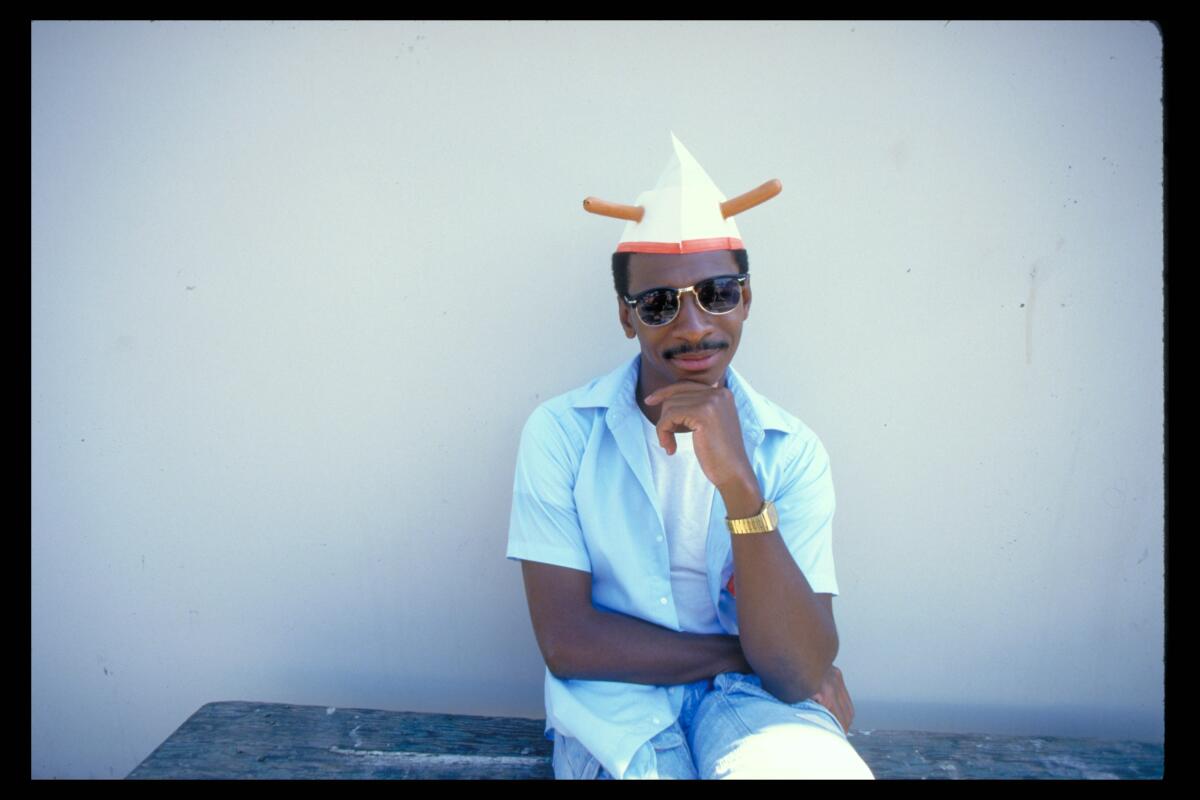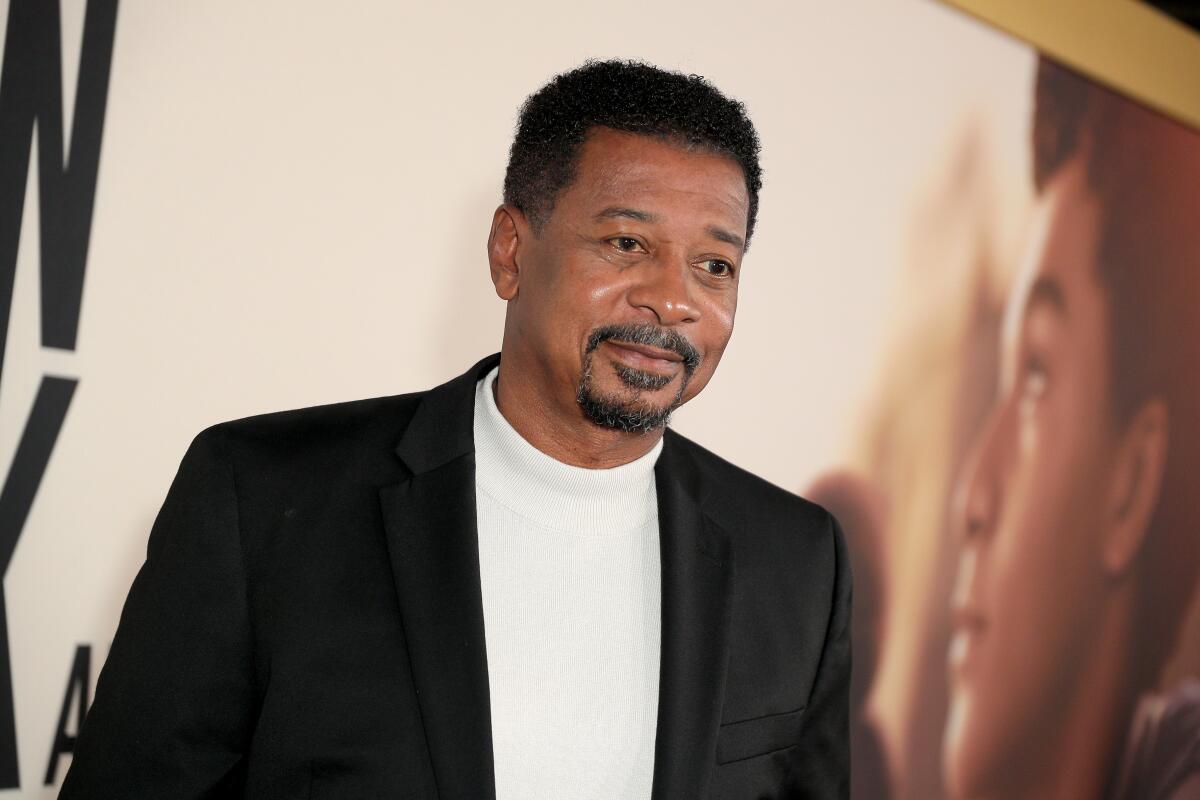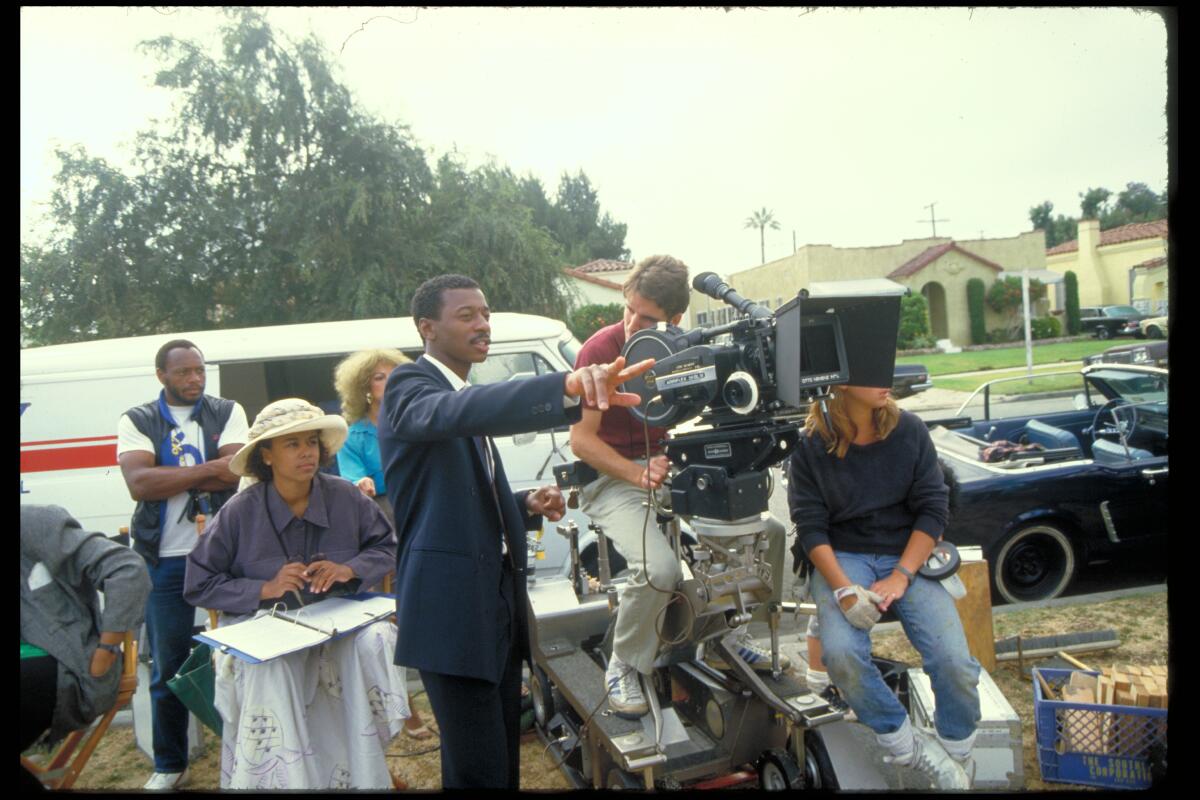He put $40,000 on credit cards to make his first film. Now ‘Hollywood Shuffle’ is a classic

Robert Townsend has never stopped moving. For a recent Zoom interview, he is on his phone from his (parked) car so he can go for one of his regular walks around a local L.A. lake once he’s finished.
“Hollywood Shuffle,” Townsend’s 1987 debut feature film as director, producer, co-writer and star, has just been released on disc by the Criterion Collection, in a newly restored 4K transfer with a new commentary track by Townsend, interviews with actors Rusty Cundieff, Bobby McGee and Anne-Marie Johnson, an essay by Aisha Harris and a 2022 radio interview with Townsend by Elvis Mitchell.
In the film, co-written with Keenen Ivory Wayans, who also appears onscreen, Townsend plays Bobby Taylor, an aspiring actor in Los Angeles. To make ends meet he works at small hot dog stand, Winky Dinky Dog, while suffering the indignities of auditioning for roles well below his talent and his dignity. The film features fanciful sketches including an ad for the Black Acting School, where students learn how to act like criminals and servants, or “Sneakin’ in the Movies,” a send-up of movie review shows.
As Times critic Sheila Benson wrote at the time, “pervading the film is an unquenchable air of optimism, even of community, which uses comedy to address some grievous inequities.”
Consider the trained black actor in today’s Hollywood, auditioning desperately for the chance to read lines like “Why you be gotta pull a knife on me?
The film was a relative hit when it was first released, especially in relation to its minuscule $100,000 budget. Shot in 12 days over 2 1/2 years, Townsend financed the film with $60,000 he had saved from acting jobs in the movies “A Soldier’s Story” — director Norman Jewison and producer Ronald Schwary also gave him unused film from the production — “Streets of Fire” and “American Flyers.” In what became a key part of the film’s legend, he also filled the gap with credit cards.
Among the films Townsend subsequently directed are concert documentary “Eddie Murphy Raw,” the dramatic musical “The Five Heartbeats” and the superhero origin story “The Meteor Man.” He has also worked extensively in television, directing episodes of the recent Netflix series “Kaleidoscope” and the Peacock limited series “The Best Man: The Final Chapters.” Besides teaching at USC film school, Townsend hopes to remount his autobiographical one-man stage show that he performed in Berkeley but was cut short by the pandemic.
As Townsend put it, “You know, I have the best life. I get to shoot, create, pitch, teach. It’s like when a little kid says, ‘When I grow up, I want to be a movie director and a writer and a producer and a professor.’ And I’m like that little kid. I really am.”

“Hollywood Shuffle” came out of your frustration as an actor. Did you intend for it to launch a directing career?
Robert Townsend: I had a deja vu moment the other week. For Black history month, I hosted two nights on Turner Classic Movies. And they were showing two of the films I started in. One was “Cooley High.” I had my first two lines in that movie. And the other was a small part in “A Soldier’s Story.” And when I did “A Soldier’s Story,” that changed my life because it was a film about people of color, and it was well-written [by] Charles Fuller — it wasn’t stereotypical and it had layers. And then there was a director, Norman Jewison, at the helm who would always ask us questions: “Is this how you would really do it?” Our voice mattered, rather than like, “I’m a white man, you’re Black, I’m going to tell you exactly what it is.”
So when that film came out and we got nominated for three Academy Awards, I was like, “Oh my God, this is movies. This is what I want to do.” And I just remember my agent says, “Robert, just be happy. You did a great movie. They only do one Black movie a year.” And I was like, “No, I want to do more of this.” And I started auditioning for a lot of stereotypical stuff. And I just remember going to Keenen’s house, we would talk about our auditions. And we had the same auditions. And one day, I got so mad because it was just degrading. It’s kind of like in “Hollywood Shuffle.” Someone was telling me to stick my butt out and jive talk and walk around and stick your lip out and bug your eyes. And I was doing it, and I felt like, “Oh my God, this is going to be my life.”
And so in that moment, I said to Keenen, we need to make our own movies. And then he was like, “Rob, you didn’t go to film school. You never directed anything.” And I was like, “I don’t care.” I grew up in the theater. I saw Black writers, directors, producers, I know I can do this. And he was like, “We’re just two boys from the projects. That means we can do anything.” And we started to make “Hollywood Shuffle.”
It’s so great in your commentary on the new disc when you’re like, “That’s my car” or “That’s my apartment.”
Townsend: I had to move because we blew the lights out, because we tied into their power. I get a call, “Mr. Townsend, you caused the whole unit to go down. You’re going to have to move.” And I was like, “Oh, OK.” And I moved into another apartment. It’s so funny. I broke every rule. It’s just the adventure, the excitement of life. Right now, this is what life is all about. Taking chances and trying things. Keenen and I talk about this all the time. You don’t know what you don’t know. And this was the bet that I did on myself, and people believed in me and we won. We shot it in 12 days, 12 of the hardest days of my life. I am co-writer, I’m the director, I’m the lead actor. I’m craft service, I’m transportation, you name it. I’m wearing all the caps.
Looking at your career moving forward from “Hollywood Shuffle,” you were often a little too ahead of the curve. You made a Black superhero movie, sort of too early. You started your own studio, but sort of too early. What do you think about that when you look back?
Townsend: It’s kind of like when you’re the first soldier. I’m an explorer and whoever cuts the path, you’re the first one to say, “Hey, there’s a path over here” and everyone goes, “There’s no path.” So yes, I had my own studio in Hollywood. It was a Hollywood professional school where all these actors like Debbie Reynolds went to school and the neighborhood had turned into an Armenian neighborhood, and I bought it and it became a 16,000-square-foot studio. I filmed “Five Heartbeats” in there, pieces of “Meteor Man” in there. I was going to do my sitcom in there, and then I lost it in an earthquake.
I’m kind of a Rubik’s Cube. And I’m an artist that I never want to be in a box. So when you look at my body of work, it’s comedy, it’s drama, it’s musicals. Sometimes some people say Robert Townsend will take on any genre. And I think that’s what real filmmakers and real artists do. So when you talk about being ahead, yeah, I was thinking of a studio back then. I was thinking about “Meteor Man” as a billion-dollar franchise back then. When I look at “Black Panther” now and how it did a billion dollars, I said, “I knew it could.”

You started making “Hollywood Shuffle” with $60,000 you saved from acting jobs. But you finished the movie on credit cards, which became not only part of the lore of the film but also a foundational idea for a lot of independent films in the 1990s. That was a big risk. What would you have done if the movie hadn’t sold?
Townsend: We would be doing this interview from a jail cell [laughs]
. So the film is done over 2 1/2 years. When we first start shooting, I don’t know what I’m doing. So I go through my money like that, the 60 is gone, but we’re looking at dailies at FotoKem in Burbank, and Keenen and I are looking at each other like, “This is really good. Oh man, this is coming together.” And I had ran out of money. So then I went on the road and did stand-up comedy, and I made more money. When I got back, it was a stack of mail in the house.
And I was going through the mail, and it was applications for credit cards — Visa, Preferred Visa, MasterCard, Chevron, Shell. And that’s when I said, “I’ll finish it with credit cards.” It’s just the entrepreneurial spirit where you just go, “OK, I can charge this, I can charge that, everybody takes credit cards.” I think I got about $40,000 in credit cards.
And I didn’t tell anybody what I was doing. Nobody really knew because I didn’t want people to go like, “You’re doing what?” I was just quiet and like, “OK, I can figure this out.” And then we finished the last pieces of the movie. And I just remember people would come in like, “Rob, when we going to shoot again?” and I was still waiting on this one Visa in the mail, and I was like, “I’m still rewriting.” Back then, the other thing was that you could rent the camera equipment on Thursday, say you’re shooting on Friday, and then bring it back on Monday. So you had three days to shoot. And that’s how we did it.
One of the unexpected results of “Hollywood Shuffle” was Eddie Murphy asked you to direct his concert film, “Eddie Murphy Raw.” In recent years he has said he cringes now at some of the material from back then. Do you feel the same way?
Robert Townsend: I never want to hurt anybody or anything. And there are some jokes in “Hollywood Shuffle” where we were just being comedians going for any joke that was on the table. And I think now there are certain jokes that I wouldn’t do that are in “Hollywood Shuffle,” that I think are in bad taste.
Were you surprised at all by Eddie Murphy’s recent speech at the Golden Globes? That he kind of went for it with his joke about Will Smith. We now think of Eddie as this sort of gentle, elder statesman, and he reminded us that he can be wickedly funny. It was great to have that Eddie Murphy pop back up for a minute.
Robert Townsend: Here’s the thing, that Eddie Murphy has never left. He’s a comedy genius. There’s certain cats that really have the gift. He really has the gift. For me, I wasn’t surprised. I was like, “Oh, there’s Eddie, that’s Eddie.” We’re comedians. And so you go, “Oh, I got the platform. I can’t wait to do this joke.”
It’s so funny because Malcolm Lee, who created “Best Man,” and I directed [episodes of “The Best Man: The Final Chapters”] and Malcolm had gotten sick and he said, “Hey Rob, can you step in and direct these last two scenes?” So I flew back to New Jersey, and in the scene he had written the line for the Terrence Howard character when there’s a fight going on and he looks at Taye Diggs and he goes, “Take my wife’s name...” And it is one of the biggest laughs in the limited series. So we were doing that and we had no idea that Eddie would get onstage and do the same. Because it’s a funny joke to do that as a callback. That’s pure comedy.
The timing of when this disc of “Hollywood Shuffle” is coming out, you can’t help but ask: Have things gotten better? With the recent Oscar nominations and the conversations that happened around “The Woman King” and “Till” and whether Hollywood still has a problem recognizing Black people and Black stories, what has it been like for you reflecting back on “Hollywood Shuffle” and what does it make you think about?
Robert Townsend: I think things have gotten better, because there was a time that we didn’t have any people of color as leads or we just had one token here, one token there. There’s a lot of production going on, and Black folks are working a lot. It is totally different than “Hollywood Shuffle” because we were talking about balancing the playing field, where we could see characters with dignity that weren’t just one type of person of color. So I think things have gotten better.
There’s always room for more. And I just think that’s always going to be the conversation. There’s always room for more. And we have a lot of Black creatives that are doing a lot of amazing work out there. So when I look at the Oscars — I’m a voting member of the academy — and I think sometimes they get it really right. And then sometimes they may miss the ball.
Your daughter Skye Townsend has been working on “The Black Lady Sketch Show,” and I can only imagine that makes you proud not only for your daughter but also to see the lessons of “Hollywood Shuffle” in action, to feel the movie has had a positive impact and to see its influence.
Robert Townsend: You hope that some of what you believe will splash on them and they will be grounded in morals and values and think about what they’re doing in the marketplace. I’m so proud of my daughter Skye. All my children are my children. They all have amazing voices. And that’s all you want as a parent: If you’re going to be in show business try to choose your roles wisely. Try to think about what you’re doing. Know that this will be around forever.
When I think about “Hollywood Shuffle” and the legacy, we planted seeds of, “How do we comment on what’s going on wrong in Hollywood and how do we correct it?” And so when young filmmakers and actors and producers come up to me, they say “Thank you.” And they say thank you from the point of, “You made me think differently about the situation and how I should approach it.”
And sometimes when they go in the rooms with casting directors, you’ve made the casting directors on another frequency, a little bit more aware of what they say and how they speak. And then I have brothers and sisters across the aisles that go, this happens to Italian people, this happens to Asian people, this happens to Indian people. And that makes me feel good because they go, “Your story is universal and it’s our story. And it gave me strength.” And at the end of the day, if this one little film done with a credit card could make a difference in people’s lives and change the landscape a little bit, I’ve done my job.
More to Read
Only good movies
Get the Indie Focus newsletter, Mark Olsen's weekly guide to the world of cinema.
You may occasionally receive promotional content from the Los Angeles Times.











